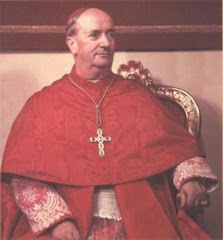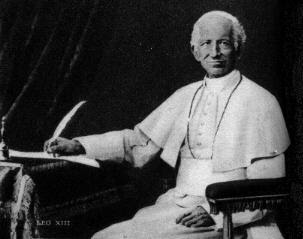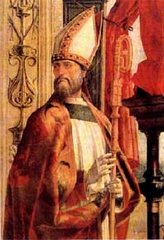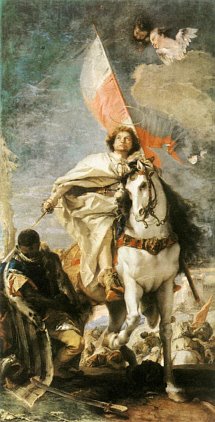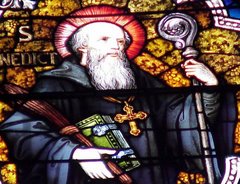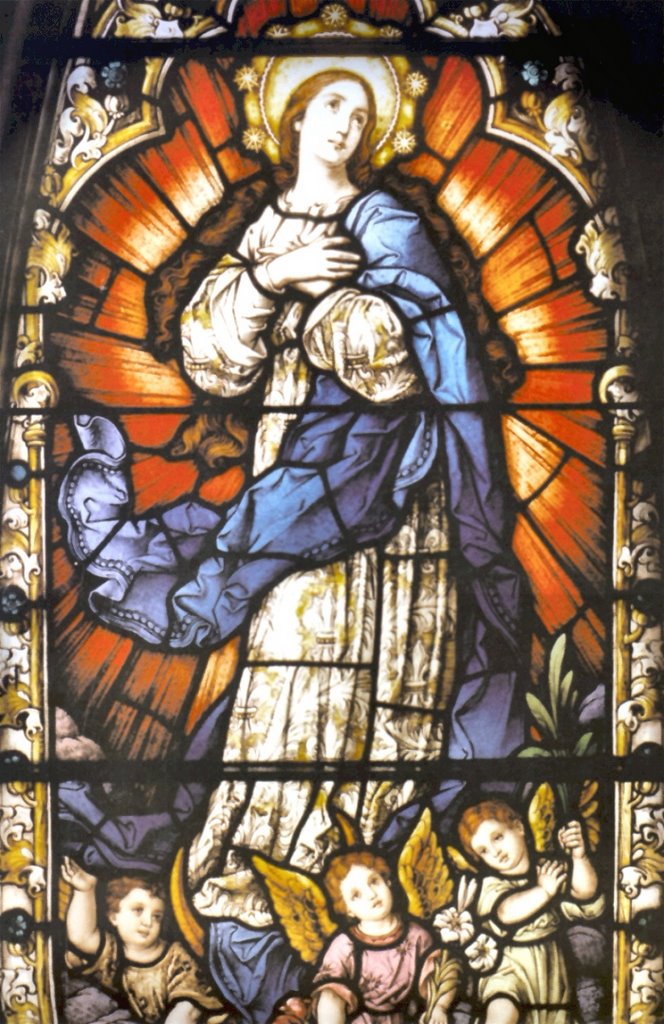This is part II in our series on justification, in which I shall show the true context of what is meant by works of the law, and how they do not refer to works performed in the Grace of God through faith in Jesus Christ. Protestants love to cite Romans 3:20, which states
"Because by the works of the law no flesh shall be justified before him. For by the law is the knowledge of sin." and then again by the verse Galations 2:16:
"But knowing that man is not justified by the works of the law, but by the faith of Jesus Christ, we also believe in Christ Jesus, that we may be justified by the faith of Christ and not by the works of the law: because by the works of the law no flesh shall be justified." The Protestant takes these two verses out of context, but how? The Protestant would have us believe that works are not necessary for justification and that we are justified by faith alone, but, then that would be a contradiction wouldn't it? We know St. James says "Thou believest that there is one God. Thou dost well: the devils also believe and tremble" meaning that faith alone is not good enough, so, does scripture contradict itself? If the scripture can contradict itself, then it cannot be divinlely inspired, and thus, the basis for atheism, that the Bible is full of contradictions. In order to understand this, we'll need to know what St. Paul and St. James were writing about.
At the beginning of Romans III we notice this: "What advantage then hath the Jew: or what is the profit of circumcision?" Okay, we know that the Jews continued to follow the old law, and continued in the works of the old law such as circumcision. What was happening was there were some christians who were following some of the rituals of the old law as if it were necessary, and St. Paul is here clarifying for them that they do not need to do this. We know that the works of the old law don't contribute to salvation as it was defined by the Council of Florence:
"The Holy Roman Church firmly believes, professes and teaches that the matter pertaining to the law of the Old Testament, of the Mosaic Law, which are divided into ceremonies, sacred rites, sacrifices, and sacraments, because they were established to signify something in the future, although they were suited to divine worship at that time, after our Lord's coming had been signified by them, ceased, and the sacraments of the New Testament began; and that whoever, even after the passion, placed hope in these matters of the law and submitted himself to them as necessary for salvation, as if faith in Christ could not save without them, sinned mortally. Yet it does not deny that after the passion of Christ up to the promulgation of the Gospel they could have been observed until they were believed to be in no way necessary for salvation; but after the promulgation of the Gospel it asserts that they cannot be observed without the loss of eternal salvation. All, therefore, who after that time (the promulgation of the Gospel)
observe circumcision and the Sabbath and the other requirements of the law, it declares alien to the Christian faith and not in the least fit to participate in eternal salvation, unless someday they recover from these errors." (Sess. 11, Feb. 4. 1442) This further clarifies what St. Paul meant by the works of the old law, the "
matter pertaining to the law of the Old Testament, of the Mosaic Law, which are divided into ceremonies, sacred rites, sacrifices, and sacraments" which some continued to follow , and St. Paul was telling them that that was an error, and that they no longer needed to place themselves under the works of the old law to obtain salvation. This is the theme throughout the whole of the same chapter [Romans 3]; but the Protestants again would have us believe otherwise. In Galations 2 we see exactly what we saw in the council of Florence:
"But knowing that man is not justified by the works of the law, but by the faith of Jesus Christ, we also believe in Christ Jesus, that we may be justified by the faith of Christ and not by the works of the law: because by the works of the law no flesh shall be justified." that the old law is not salvific, and we can not put our faith in the functions of the old law for our salvation, but in Christ. We will now compare the two [Council of florence in italics, and Galations in normal font]:
"that whoever, even after the passion, placed hope in these matters of the law and submitted himself to them as necessary for salvation, as if faith in Christ could not save without them, sinned mortally." "But knowing that man is not justified by the works of the law, but by the faith of Jesus Christ, we also believe in Christ Jesus, that we may be justified by the faith of Christ and not by the works of the law: because by the works of the law no flesh shall be justified."
and now Florence and Romans:
"what is the profit of
circumcision?... Because by the works of the law
no flesh shall be justified before him."
"the matter pertaining to the law of the Old Testament, of the Mosaic Law... All, therefore, who after that time (the promulgation of the Gospel)
observe circumcision and the Sabbath and the other requirements of the law, it declares alien to the Christian faith and not in the least fit to participate in eternal salvation.."
And also, we seek clarification from the Bible. Later in Galations 3, we see this "Is he the God of the Jews only?" clarifying that it is not by the law which the Jews follow, the mosaic law, by which the Jews followed as required in the Old Testament, we see works of the law, and circumcision, and Jews, all of this refers to the old law, by which we are not saved, but by the faith in Jesus Christ as confirmed by the Gospel "he who does not believe shall not be saved".
The Council of Florence confirms this by stating that no one who follows the requirements of the law can be saved, this is exactly what St. Paul it telling the Romans and the Galations.
Clearly, St. Paul and St. James are talking about two different things, St. Paul is talking about the functions of the old law, and St. James is talking about good works such as feeding the hungry, and visiting the sick ect. Nowhere do we see faith alone in this issue, it is not in the scriptures.
For instance, if we take into consideration Romans 4:9 , which further clarifies what is meant by works of the law and circumcision , we notice the context which St. Paul intended his earlier statement to be read by. And, as circumcision was a work of the old law reuired for the justification of the people of Israel, so he states that one no longer needs the works of the old law to find justification before God. Nowhere does he mention good works, such as feeding the hungry ect.
Also, another weapon of the Protestants is Ep. 28-9 which states: "For by grace you are saved through faith: and that not of yourselves, for it is the gift of God. Not of works, that no man may glory." which simply means that we are saved by the free gift of grace from God, and not by our own works, done without that grace. Again, this does not mean "Faith alone ", it means that we are saved through faith, by grace, not by any works tht we do all by ourselves without the grace of God, because we can do nothing without God. Protestants misquote this in order for them to legitametize their claims that the Catholic Traditions contradict the Bible. Paul simply means that we are not saved by the operations of the Law, but by Faith in Our Lord Jesus Christ.
Paul means that we cannot do anything of ourselves that we might attribute to our own selves, and not to God, that he means that we can only produce salutary works by faith in the Lord, by His Graces bestowed upon us. This is why in Romans Ch. 4, he states that if by works Abraham was justified, he would have been able to attribute it to himself, that he should be able to boast it. This does not, however, negate the words of St. James which states that we must have good works done by faith through grace to be justified, we know that these we must have; and since they be done by God's grace that their fruitfulness is attributed to God's grace.
So, next time in our series on Justification, we will see how justification is an ongoing process which is a continuing thing, and not something that happens all at once, but is something we must strive after each and every day. We will also see how justification begins on the inside, and that it is accomplished by our own dispositions and faith and is not simply what happens as a result of a divine pronouncement.




